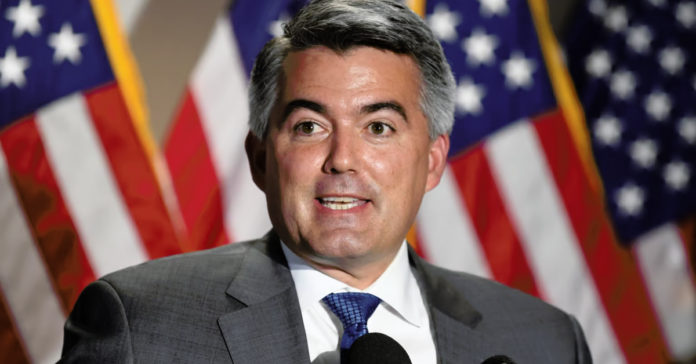U.S. Sen. Cory Gardner (R-Colo.) faces a tough battle for reelection in a state that President Trump did not carry in 2016 and Democrats swept for all state offices.
His path to another six-year term is being challenged by former Colorado Gov. John Hickenlooper, who has decided to make the state’s outdoors and resources key issues over the next eight months.
“In Colorado, it’s in our DNA, this appreciation for public lands and outdoor recreation and all the different attributes that being in the outdoors creates,” Hickenlooper told E&E News this week.
Hickenlooper said the path to 2020 victory in his party primary and the battle against the incumbent, Gardner, will take the road less traveled—the one through Colorado’s wilderness and public lands.
“So many registered independents came to Colorado because they believe in it,” Hickenlooper said. “By that I mean, they appreciate that this is not only one of the most beautiful places in the entire country but it’s a place where we celebrate that beauty and believe that it helps make us better people. We’re healthier, and not just physically — mentally and spiritually, we’re better off.”
Among his other campaign plans, Hickenlooper hopes to stave off a primary challenge from former Colorado House Speaker Andrew Romanoff and unseat Gardner with a strong environmental and public lands policy program that will shore up his base and give him the edge in November. Hickenlooper submitted signatures this week to qualify for his party’s June primary.
That includes reducing the “carbon domination” of public lands leasing for oil and gas production, and more support for the outdoor recreation industry.
“If you look at most of the new leases, there aren’t that many good places to lease anyway,” Hickenlooper said yesterday. “I don’t have a problem saying, ‘On public lands, we shouldn’t do any additional leasing.’”
Contrary to Hickenlooper’s campaign proposals, however, most Coloradans support leasing public lands for oil and natural gas production. A Summer 2019 survey from Center for Western Priorities on public lands issues showed continued support for oil and gas development on public lands within strict limitations, dominating “keep it in the ground” calls for no additional development 53 percent to 19 percent.
The results are nearly identical across five western states, Arizona, Montana, New Mexico, Nevada and Colorado.
Hickenlooper’s biggest primary challenger, Romanoff, has called for a ban on fracking and ending “new fossil fuel extraction on public lands.” That puts Romanoff more in line with several Democratic frontrunners for the party’s presidential nod, such as U.S. Sens. Bernie Sanders and Elizabeth Warren, whom Hickenlooper was unable to gain traction against during his own presidential bid in 2019.
As for the multi-billion dollar outdoor economy—Gardner has sponsored legislation calling for an annual review by the Commerce Department to assess the economic contribution of outdoor recreation.
Hickenlooper’s “Plan to Protect Our Outdoors,” published on Medium.com earlier this month, lays out his plan to push Colorado’s natural resources and outdoor endowments as part of his message for the November 2020 ballot.
“But the outdoors are not simply about the economy. They are the lasting symbol of Colorado’s pioneering heritage and represent our ability and obligation to leave the world better off than we found it. Our lands are being affected by climate change, drought, habitat fragmentation, invasive species, and human development,” Hickenlooper wrote. “Fish and wildlife habitats are being lost or degraded. Snowpack and the runoff of fresh-water are expected to decline as a result of climate change. Increasing public recreation pressures are squeezing federal, state, and local budgets. And we too often sacrifice discipline and responsibility in our energy development on public lands,” he added.
To challenge Gardner—and the current Trump Administration’s policies—Hickenlooper hopes to garner the support from those who also oppose current policies, and draw a more favorable portrait for himself among key green constituencies.
Given his less than stellar rating among environmental and anti-fossil fuel activists frustrated by his eight years as Colorado’s governor, and being labelled “dangerous” by the Sunrise Movement who endorsed his primary opponent last fall, the “conservation plan” ticks off several planks of the green platform.
Hickenlooper promises to “oppose selling off federal lands,” citing the reduction in size of national monuments in Utah, a move local and tribal leaders applauded in 2017, as Western Wire reported at the time.
This includes stopping “any efforts to diminish the scope and quality of our land, water, and outdoor resources,” undoubtedly a shot at the current administration’s revision of the contentious Waters of the United States rule.
The former Colorado governor also lists prioritizing the National Parks maintenance backlog, which Western Wire has extensively covered and has received considerable bipartisan support.
In a direct shot at Gardner, Hickenlooper calls for permanent, full funding of the Land and Water Conservation Fund (LWCF).
Gardner was a key proponent in recent years for the funding, touting grants and the passage of the Natural Resources Management Act signed into law in 2019.
“This grant funding shows why it was so important to permanently reauthorize the LWCF,” Gardner said. “These millions of dollars will go toward Colorado projects that rely on LWCF funding for conservation, so that future generations of Coloradans can enjoy our state’s public lands and have access to our great outdoors,” Gardner said last September.
Finally, Hickenlooper also vows to expand access to the outdoors “for communities of color and low-income Coloradans,” drawing on LWCF funds to ensure entry and “increase access to and equity in the outdoors.”

